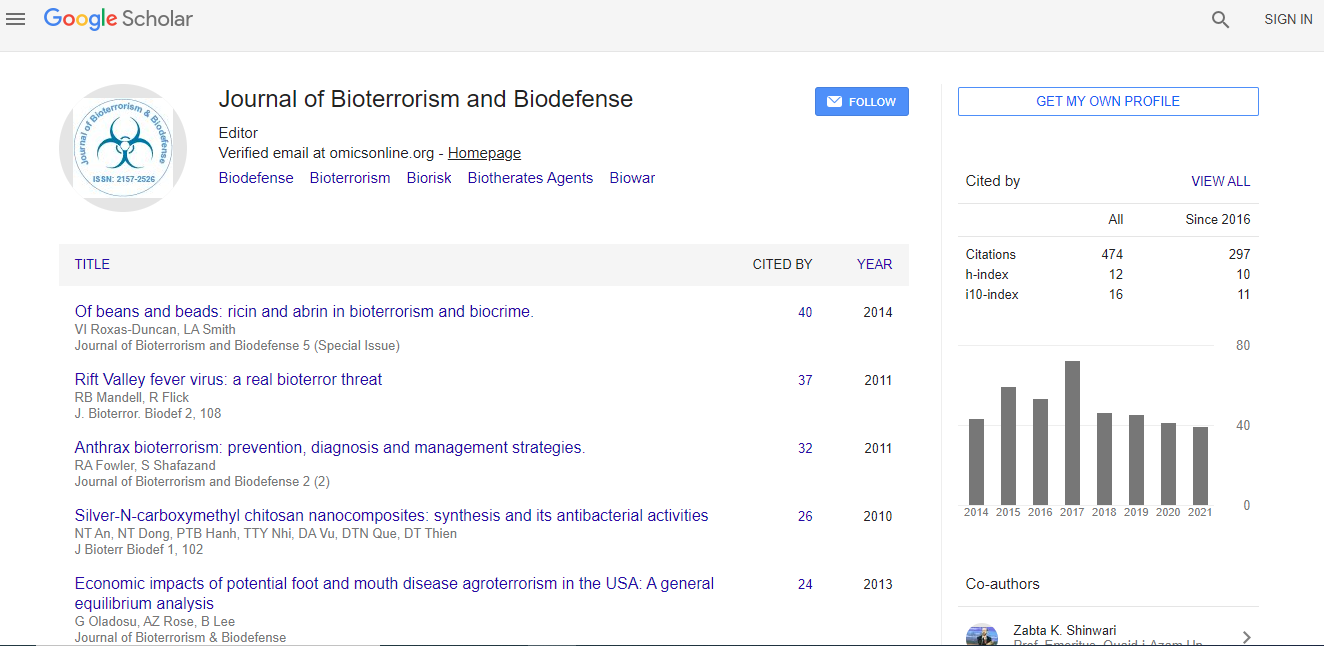Our Group organises 3000+ Global Conferenceseries Events every year across USA, Europe & Asia with support from 1000 more scientific Societies and Publishes 700+ Open Access Journals which contains over 50000 eminent personalities, reputed scientists as editorial board members.
Open Access Journals gaining more Readers and Citations
700 Journals and 15,000,000 Readers Each Journal is getting 25,000+ Readers
Google Scholar citation report
Citations : 1129
Journal of Bioterrorism & Biodefense received 1129 citations as per Google Scholar report
Indexed In
- CAS Source Index (CASSI)
- Index Copernicus
- Google Scholar
- Sherpa Romeo
- Open J Gate
- Genamics JournalSeek
- Academic Keys
- JournalTOCs
- ResearchBible
- China National Knowledge Infrastructure (CNKI)
- Ulrich's Periodicals Directory
- RefSeek
- Hamdard University
- EBSCO A-Z
- OCLC- WorldCat
- SWB online catalog
- Publons
- Geneva Foundation for Medical Education and Research
- Euro Pub
- ICMJE
Useful Links
Recommended Journals
Related Subjects
Share This Page
Ian Watson

Ian Watson
Systems, Power and Energy Research Division
School of Engineering
University of Glasgow, UK
Tel: 440-141-330-5258
Biography
Dr Watson’s first degree was in Applied Physics, followed by a PhD from the Engineering Faculty at the University of Glasgow in “Optimising the gaseous discharge and optical coupling of a pulsed CO2 laser” which was specifically designed for material processing of reflective and refractory materials. In the early 1990s he began to research the effects of high power laser beams on microorganisms and laser sterilization and inactivation. He has published on the direct effect of a range of lasers and their efficacy on treating different substrates, including solids, liquids and air and a range of microorganisms from E. coli to B. globigii, an anthrax simulant. As well as building lasers and laser scanning inactivation systems he has developed combined systems for decontamination and inactivation applications. These systems comprised: lasers, UV, pulsed flashlamp systems, microwave and chemical treatments. Laser and plasma systems have been specifically designed, fabricated and and successfully tested for treating air.
Research Interest
Dr. Ian Watson is interested in how new decontamination systems and processes can lead to a safer environment and reduce the threat of food contamination and poisoning; and how the treatments can improve shelf life and food quality. As a part of this process, real time detection of microorganisms plays a role in process optimisation.
Certificate
Global Speakers in the subject
Global Experts in the subject
Publications
| Dhiren J Shah, Allan C Andi, Keith Ramesar and Gillian Watson MT |
| Case Report: OMICS J Radiology 2013, 2: 122 |
| DOI: 10.4172/2167-7964.1000122 |

 Spanish
Spanish  Chinese
Chinese  Russian
Russian  German
German  French
French  Japanese
Japanese  Portuguese
Portuguese  Hindi
Hindi 
